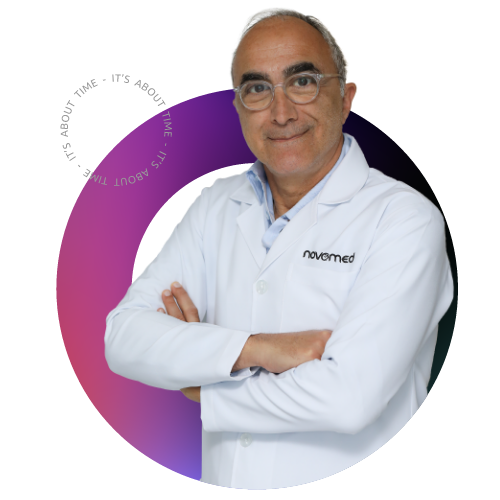Ulcerative colitis (UC) is a chronic inflammatory bowel disease primarily affecting the rectum and colon (the large intestine’s inner lining); It causes inflammation and ulcers in the lining of the digestive tract, resulting in symptoms such as diarrhea, abdominal pain, and rectal bleeding.
Multiple factors, including genetic predisposition, immune system dysfunction, and environmental factors, contribute to the development of UC. Ulcerative colitis can occur at any age, but it typically first manifests in people between ages 15 and 30.
Although there is no known cure for UC, numerous treatments can significantly reduce inflammation, control symptoms, and induce and maintain remission.
What are the types of ulcerative colitis?
Ulcerative colitis is a persistent condition that may impact several areas of the colon and rectum; It is usually categorized based on the location of the inflammation, including:
- Ulcerative proctitis: Inflammation of the rectum.
- Proctosigmoiditis: Inflammation that affects the rectum and the bottom part of the colon.
- Left-sided colitis: Inflammation affecting the rectum and the colon’s left side.
- Pancolitis: Inflammation involving the whole colon.
What are the symptoms of ulcerative colitis?
The symptoms of ulcerative colitis can vary in severity depending on the extent of the inflammation and its location. Over time, as the inflammation flares up and then subsides again, symptoms also appear and disappear.
Common symptoms of ulcerative colitis include:
- Abdominal pain and cramping
- Chronic diarrhea, often with blood or mucus
- Rectal bleeding
- Urgency and tenesmus (feeling of incomplete bowel movements)
- Fatigue
- Weight loss and loss of appetite
- Skin sores
- Anemia, also known as low red blood cell count (due to chronic bleeding)
What are the causes of ulcerative colitis?
Although the exact cause of ulcerative colitis is unknown, experts believe it results from an interaction between genetic and environmental factors.
Some possible factors include:
- Age: Even though ulcerative colitis can strike at any age, it often manifests before the age of 30 or after the age of 60.
- Genetics: People with a family history of IBD, including UC, are more likely to develop the condition.
- Immune system dysfunction: An abnormal immune response plays an important role in the development of UC. Inflammation results from the immune system mistakenly attacking the cells of the digestive tract.
- Environmental factors: Environmental factors like nutrition, stress, microbial imbalances, and exposure to certain infections may cause the onset or worsening of ulcerative colitis in susceptible people.
How is ulcerative colitis diagnosed?
During your consultation, our gastroenterologist will review your medical history, ask about your symptoms, and perform a physical examination to determine whether you have ulcerative colitis. They may order blood tests to assess the degree of inflammation and other ulcerative colitis-related markers and analyze stool samples to rule out infections.
The doctor may also perform a colonoscopy or sigmoidoscopy to visualize the colon and rectum, examine the level of inflammation, and take tissue samples (biopsy) for analysis. Additionally, imaging tests such as X-rays, CT scans, or MRI scans may be used to assess the level of inflammation and find complications such as abscesses.
How is ulcerative colitis treated?
The goal of ulcerative colitis treatment is to reduce inflammation, manage symptoms, and enhance the quality of life.
Treatment options may include:
- Medications: Anti-inflammatory medications, such as aminosalicylates, corticosteroids, and immunomodulators, are commonly prescribed to reduce inflammation and manage symptoms. Biologic therapies, such as tumor necrosis factor (TNF) inhibitors, may also be used in moderate-to-severe cases that do not respond well to other treatments.
- Lifestyle modifications: Making specific changes to your way of life can help you manage your symptoms and lessen the frequency of flare-ups. These may include eating a low-residue or low-fiber diet, drinking plenty of water, staying away from trigger foods, controlling stress, and exercising regularly.
- Natural therapies: Mind-body practices like meditation and yoga and complementary therapies like acupuncture and probiotics may help control symptoms and enhance overall well-being.
- Surgery: You may require surgery to remove your colon and rectum (proctocolectomy) if medication and lifestyle changes are ineffective or complications arise. The proctocolectomy can be performed with the choice of either an ileostomy or an ileal pouch-anal anastomosis (IPAA) to restore bowel function.
- Ileostomy: A permanent or temporary ileostomy may be performed in some circumstances; This involves making a hole (stoma) in the abdominal wall so that waste can pass from the body and into a bag attached to the stoma.
- Ileal pouch-anal anastomosis: IPAA may be performed with the proctocolectomy to create a little pouch out of your small intestine and attach it to your anus.
Schedule your appointment at Novomed today!
If you are experiencing symptoms of ulcerative colitis, contact one of expert gastroenterologists in Dubai by calling toll-free 8006686 or clicking the chat icon at the bottom of the screen to manage your condition effectively.


























